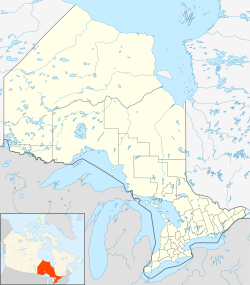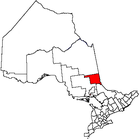Matachewan
Matachewan | |
|---|---|
| Township of Matachewan | |
 | |
| Motto: Where the highway ends... the adventure begins! | |
| Coordinates: 48°00′N 80°39′W / 48.000°N 80.650°W | |
| Country | Canada |
| Province | Ontario |
| District | Timiskaming |
| Incorporated | 1995 |
| Government | |
| • Type | Township |
| • Reeve | Mark Stickel |
| • Federal riding | Timmins-James Bay |
| • Prov. riding | Timiskaming—Cochrane |
| Area | |
| • Land | 543.58 km2 (209.88 sq mi) |
| Population (2016)[1] | |
• Total | 225 |
| • Density | 0.4/km2 (1/sq mi) |
| Time zone | UTC-5 (EST) |
| • Summer (DST) | UTC-4 (EDT) |
| Postal Code | P0K 1M0 |
| Area code(s) | 705, 249 |
| Website | www |
Matachewan is a township in Timiskaming, Northeastern Ontario, Canada, located at the end of Ontario Highway 66 along the Montreal River. The name is derived from the Cree word for "meeting of the currents".[2]
The town's main economy is based on mineral mining, mainly gold mining, with some tourism.
History
[edit]Matachewan began as a trading post of the Hudson's Bay Company, called Fort Matachewan, located about 8 kilometres (5.0 mi) north of the present town site. It consisted only of a large depot and stores, with a church added later on. The local First Nations, who traded their furs here, would camp along the Montreal River but not settle permanently.[3]
Jake Davidson discovered gold in 1916 and teamed up with Weldy Young in 1930 to start the Young-Davidson mine. Sam Otisse staked a claim next to Davidson in 1917, which became the Matachewan Consolidated Mines. Alex Mosher staked claims which became the Ashley Gold Mine (1932-1936).[4]
The impetus to the town's growth came in the 1920s when mineral deposits, such as gold, copper, and molybdenite, were found in the area. From then on it experienced boom and bust cycles of typical mining towns, depending on the swings in commodity prices, but its economy has gradually shifted to forestry and tourism.[3]
In January 1976, the Improvement District of Matachewan was formed, and in 1995, it was incorporated as a township.
The Otisse Lake overflowed into mine tailings on 17 Oct. 1990, and 170,000 cubic metres of mine slimes entered the Matachewan River.[4]
In 2006, a medivac helipad was built to help accommodate the possibility of injuries that may occur at the Young-Davidson mine site. In 2008, an old and worn out wooden bridge over the Montreal River which was built in 1937 was replaced with a new steel-concrete reinforced structure for safety reasons regarding the heavy traffic to/from the mine.[5]
Geology
[edit]Matachewan is on the southwest portion of the Abitibi greenstone belt and within the Abitibi gold belt. Between 1933 and 1957, the Young-Davidson Mine and the Matachewan Consolidated Mine produced 9.6 million tonnes of ore containing 3.1 grams of gold per ton and 0.93 grams per ton of silver. Between 1979 and 1980, Pamour Porcupine Mines Limited open-pit mining produced 18,000 tonnes of ore containing more than 3.4 grams per ton of gold.[6]
Demographics
[edit]| Year | Pop. | ±% |
|---|---|---|
| 1986 | 491 | — |
| 1991 | 453 | −7.7% |
| 1996 | 402 | −11.3% |
| 2001 | 308 | −23.4% |
| 2006 | 375 | +21.8% |
| 2011 | 409 | +9.1% |
| 2016 | 225 | −45.0% |
| Statistics Canada[7][8][1] | ||
In the 2021 Census of Population conducted by Statistics Canada, Matachewan had a population of 268 living in 134 of its 202 total private dwellings, a change of 19.1% from its 2016 population of 225. With a land area of 539.56 km2 (208.33 sq mi), it had a population density of 0.5/km2 (1.3/sq mi) in 2021.[9]
| 2021 | 2016 | 2011 | |
|---|---|---|---|
| Population | 268 (+19.1% from 2016) | 225 (-45.0% from 2011) | 409 (9.1% from 2006) |
| Land area | 539.56 km2 (208.33 sq mi) | 543.58 km2 (209.88 sq mi) | 543.63 km2 (209.90 sq mi) |
| Population density | 0.5/km2 (1.3/sq mi) | 0.4/km2 (1.0/sq mi) | 0.75/km2 (1.9/sq mi) |
| Median age | 53.2 (M: 52.8, F: 53.2) | 52.7 (M: 52.2, F: 52.9) | 50.8 (M: 48.0, F: 52.5) |
| Private dwellings | 202 (total) 134 (occupied) | 166 (total) | 260 (total) |
| Median household income | $67,500 | $57,216 |

Culture
[edit]Matachewan is known for celebrating local cultures every July during the Matachewan Villages Festival event.
Transportation
[edit]Provincial highways:
See also
[edit]- List of townships in Ontario
- List of francophone communities in Ontario
- Kirkland Lake
- Porcupine Gold Rush
- Cobalt silver rush
- Red Lake, Ontario
- Greenstone, Ontario
- Hemlo, Ontario
References
[edit]- ^ a b c "Census Profile, 2016 Census: Matachewan, Township". Statistics Canada. 8 February 2017. Retrieved July 17, 2019.
- ^ Hamilton, William (1978). The Macmillan Book of Canadian Place Names. Toronto: Macmillan. p. 158. ISBN 0-7715-9754-1.
- ^ a b "About Matachewan". Township of Matachewan. Archived from the original on January 7, 2009. Retrieved 2009-07-31.
- ^ a b Barnes, Michael (1995). Gold in Ontario. Erin: The Boston Mills Press. pp. 62–63. ISBN 155046146X.
- ^ Perry Kong (April 30, 2007). "The Community Where Adventure Begins" (PDF). Northern News. Archived from the original (PDF) on February 23, 2014. Retrieved February 9, 2012.
- ^ Powell, W.G.; Kilbourne, M.W.; Hodgson, C.J. (1991). "Gold Related Geology of the Matachewan Camp". Society of Economic Geologists. Archean Gold Deposits of the Matachewan-Kirkland Lake-Larder Lake Area, Ontario, Canada (Guidebook Series Vol. II): 72.
- ^ a b "Corrections and updates". Statistics Canada. 2012-10-24. Retrieved 2012-11-11.
- ^ 1996, 2001, 2006, 2011 census
- ^ "Population and dwelling counts: Canada, provinces and territories, census divisions and census subdivisions (municipalities), Ontario". Statistics Canada. February 9, 2022. Retrieved April 2, 2022.
- ^ "2021 Community Profiles". 2021 Canadian census. Statistics Canada. February 4, 2022. Retrieved 2023-10-19.
- ^ "2016 Community Profiles". 2016 Canadian census. Statistics Canada. August 12, 2021. Retrieved 2019-07-17.
- ^ "2011 Community Profiles". 2011 Canadian census. Statistics Canada. March 21, 2019. Retrieved 2014-02-04.


